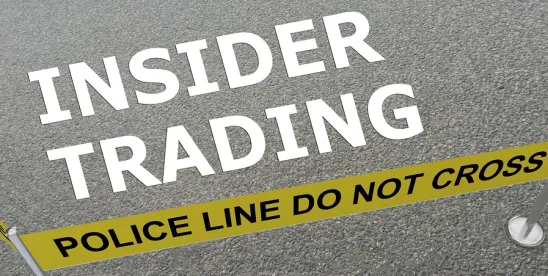On June 21, a jury in the U.S. District Court for the Central District of California found the former CEO and Chairman of Ontrak, Inc., a publicly traded healthcare company, guilty on one count of securities fraud and two counts of insider trading based on a scheme involving trading plans entered into pursuant to Rule 10b5-1. It is a first-of-its-kind prosecution for the Department of Justice that reveals a capability and willingness to pursue insider trading cases for failure to comply with or misuse of plans under Rule 10b5-1.
Rule 10b5-1 allows corporate insiders of publicly traded companies to set up a plan in order to trade company stock despite knowledge of material non-public information by offering an affirmative defense to insider trading charges. However, an insider cannot avail themselves of the affirmative defense if they are in possession of that material non-public information at the time of plan adoption. On December 14, 2022, the Securities and Exchange Commission (“SEC”) adopted amendments to Rule 10b5-1 under the Securities Exchange Act of 1934, 17 C.F.R. § 240.10b5-1. The amendments imposed an additional “good faith” requirement to access the affirmative defense provided by subsection (c) of the Rule and bolstered other protections for investors and markets from insider trading. The amendments also adopted a 90-day cooling-off period for directors and officers after adoption of a 10b5-1 trading plan before trading can commence under the plan.
The Department of Justice’s case against Ontrak’s former CEO and Chairman, Terren Peizer, revealed that Peizer had entered into two Rule 10b5-1 trading plans in the summer of 2021 after learning material non-public information related to the impending termination of Ontrak’s largest customer contract. According to court documents, Peizer entered into the first 10b5-1 trading plan in May 2021 after learning that the relationship between Ontrak and the customer was deteriorating and entered into the second 10b5-1 trading plan in August 2021 mere minutes after he was told that the contract would likely be terminated. Six days after Peizer adopted the second 10b5-1 trading plan, Ontrak publicly announced that the customer had terminated the contract, and Ontrak’s stock price declined by over 44%.
Peizer’s refusal to abide by the cooling-off period required by Rule 10b5-1 allowed Peizer to avoid more than $12.5 million in losses by trading based on material non-public information within days of plan adoption. Peizer’s conviction represents law enforcement’s revitalized commitment to prosecuting insider trading violations for failure to comply with Rule 10b5-1. Principal Deputy Assistant Attorney General Nicole M. Argentieri, head of the Justice Department’s Criminal Division, was clear: “This is the Justice Department’s first insider trading prosecution based exclusively on the use of a trading plan, but it will not be our last.”




 />i
/>i

